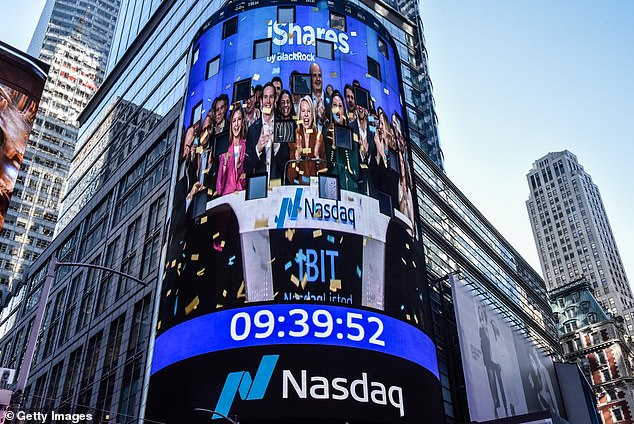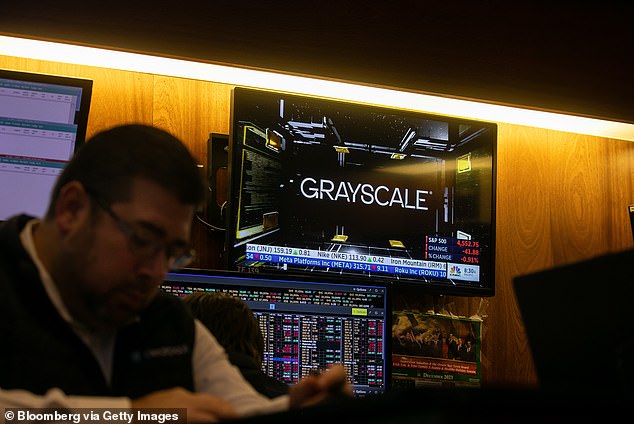SEC approves bitcoin ETFs – here are the cheapest and most expensive funds YOU can buy
Yesterday’s approval by the Securities and Exchange Commission of 11 exchange-traded bitcoin funds allowed brokers to start selling this morning, but costs will vary.
A $10,000 investment in the most expensive one would result in costs of $150 per year, but the best would cost nothing for six months and $20 per year thereafter.
The new ETFs, which can be bought and sold on some of the country’s largest exchanges, allow retail investors and institutions to own shares in funds that track the spot price of bitcoin.
More than $3.5 billion in new funds changed hands on the first day – with Grayscale, BlackRock and Fidelity leading the way, according to Bloomberg data.
When they went on sale, Bitcoin’s price reached almost $48,000 before retreating to $46,300 in the afternoon.
The fees investors pay to fund managers can vary – so which of the eleven new ETFs is the cheapest? As of January 11, the Bitwise Bitcoin ETF had the lowest annual fee at 0.2 percent, while Grayscale Bitcoin Trust had a 1.5 percent fee.
The Bitwise Bitcoin ETF (BITB) had the lowest fee at 0.20 percent, while Grayscale Bitcoin Trust (GBTC) had a 1.50 percent fee as of January 11.

The Nasdaq sign in Times Square shows scenes of the opening bell ringing as bitcoin spot ETFs launch on the Nasdaq on January 11.
Bitcoin ETFs will save those interested in bitcoin exposure from the need to purchase the cryptocurrency and personally hold it in their own digital wallets. That saves them significant amounts of commission and fees, but buying them doesn’t come without costs.
While many funds have initially offered to waive fees, either for a period of time or until they reach a certain size, they will all eventually take some of their investors’ money in return for management.
This fee, also called the ‘expense ratio’, varies from 0.2 to 1.5 percent for the new ETFs.
For example, an expense ratio of 0.3 percent means that for every € 1,000 invested, € 3 is withdrawn annually by the asset manager.
Due to the considerable hype and the fact that all funds have been approved at once, there is fierce competition.
Competition is so fierce that issuers have started adjusting their fees before approval, undercutting each other and offering increasingly attractive incentives to entice investors.
Seven of the 11 ETF issuers offered fee waivers, which eliminate or reduce fees for a fixed period of time or until the fund reaches a certain size – in most cases $1 billion or $5 billion.
Ark 21Shares, Valkyrie and Invesco Galaxy all filed initial filings suggesting they would charge higher fees but later reduced them.
Similarly, Bitwise reduced its initial fee from 0.24 percent to 0.20 percent, making it the smallest of the group.
Grayscale stands out from the group, with a higher rate of approximately 1.5 percent. The fund is unique from the others because it has existed for a decade as a trust that was only converted into an ETF on Thursday.
It also reduced its fees from 2 percent to 1.5 percent. The GBTC fund had nearly $30 billion in assets under management before the SEC’s approval, meaning it was less reliant on low fees to build its size.

Grayscale Bitcoin Trust (GBTC) charged 1.50 percent fees, the highest of the bunch
“We believe the product’s management fee reflects its value as investors and the broader capital markets will benefit from GBTC’s large asset base, strong liquidity and 10-year track record,” Grayscale CFO Edward McGee said in a statement declaration.
CEO Michael Sonnenshein told CNBC Thursday that his experience with cryptocurrencies justified the higher costs.
‘We are a crypto specialist. We’ve been through all the different types of speed bumps and developments within the crypto ecosystem. For many of these asset managers and issuers, this is the first time they have had to deal with the complexities that come with running these types of products,” Sonnenshein said.
The majority of fees for bitcoin funds range from 0.2 percent to 0.3 percent, which is higher than most S&P 500 tracking funds, which can be less than 0.1 percent.
Nevertheless, they are lower than those of the most popular commodity funds, many of which charge around 0.5 percent.
